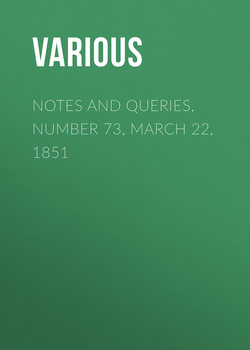Notes and Queries, Number 73, March 22, 1851

Реклама. ООО «ЛитРес», ИНН: 7719571260.
Оглавление
Various. Notes and Queries, Number 73, March 22, 1851
Notes
ON THE WORD "RACK" IN SHAKSPEARE'S TEMPEST
ANCIENT INEDITED POEMS, NO. III
FOLK LORE
DR. MAITLAND'S ILLUSTRATIONS AND ENQUIRIES RELATING TO MESMERISM
Minor Notes
Queries
HENRY SMITH
Minor Queries
Minor Queries Answered
Replies
SCANDAL AGAINST QUEEN ELIZABETH
THE MISTLETOE ON THE OAK
UNIVERSALITY OF THE MAXIM, "LAVORA COME SE TU," ETC
Replies to Minor Queries
Miscellaneous
NOTES ON BOOKS, SALES, CATALOGUES, ETC
BOOKS AND ODD VOLUMES WANTED TO PURCHASE
Notices to Correspondents
AUTOBIOGRAPHY
REV. WILLIAM WALFORD,
Отрывок из книги
As another illustration of the careless or superficial manner in which the meaning of Shakspeare has been sought, allow me to call attention to the celebrated passage in the Tempest in which the word "rack" occurs. The passage really presents no difficulty; and the meaning of the word, as it appears to me, might as well be settled at once and for ever. I make this assertion, not dogmatically, but with the view of testing the correctness of my opinion, that this is not at all a question of etymology, but entirely one of construction. The passage reads as follows:—
As I have expressed my opinion that this is not at all a question of etymology, I shall not say more in reference to this view of the case than that "rack," spelt as in Shakspeare, is a word in popular and every-day use in the phrase "rack and ruin;" that we have it in the term "rack off," as applied to wine, meaning to take from the rack, or, in other words, "to leave a rack" or refuse "behind," racked wine being wine drawn from the lees; and that it is, I believe, still in use in parts of England, meaning remains or refuse, as, in the low German, "der Wraek" means the same thing. Misled, however, by an unusual mode of spelling, and unacquainted with the literature of Shakspeare's age, certain of the commentators suggested the readings of track and trace; whereupon Horne Tooke remarks:—
.....
The next poem that I shall give is copied from Harleian MSS., 367., art. 60., fol. 158. It is entitled—
The poem has no subscription, nor, from the appearance of the paper, should I say there had been one. The comparatively modern phraseology points to a late era. The poem is bound up with a quantity of John Stowe's papers, and I think is in his handwriting, upon comparing it with other papers known to be his in the same book. As it is my chief object (next to contributing to the preservation and publication of these ancient ballads) to obtain data regarding the anonymous productions of the earlier days of England's literature, any remarks, allow me to say, that other contributors will favour our medium of intercommunication with, will be much appreciated by
.....